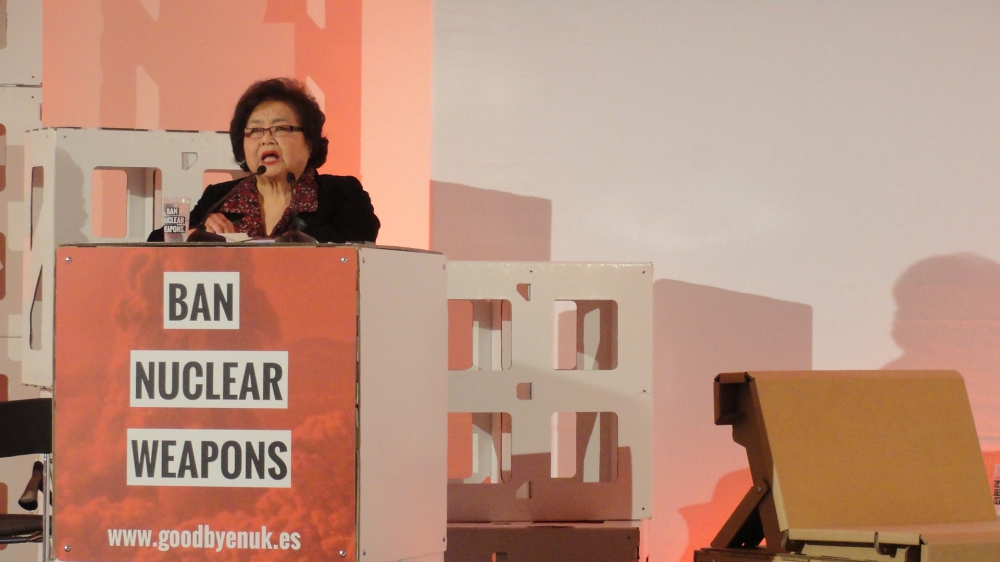Three days after the historic conference in Vienna on the humanitarian impact of nuclear weapons, we are still digesting the statements, ideas and developments that will shape the debate on nuclear disarmament in the coming months.
By Wilbert van der Zeijden
158 states, including 4 nuclear armed states joined the Vienna conference to discuss the impact of nuclear detonations on humans and the environment. The first day was reserved for testimonies of survivors of nuclear explosions and contributions from experts. Concluding, experts and surviors strengthened the body of evidence that suggests that relief agencies are entirely incapable of dealing with the human suffering that results from even relatively small nuclear explosions and that the impact of nuclear explosions is altogether more severe and longer lasting than was previously believed.
the second day of the conference was reserved for statements by countries and international organisations. More than 100 statements were caught brilliantly in the “Report and Summary of Findings” delivered by the Austrian Chair Alexander Kmentt
The support shown by dozens of countries for the start of negotiations of a treaty leading to the prohibition and elimination of nuclear weapons was supported by what is now called the “Austrian Pledge”, a moving statement delivered by Secretary-General of the Austrian Ministry of Foreign Affairs Michel Linhart in which Austria promises ‘to identify and pursue effective measures to fill the legal gap for the prohibition and elimination of nuclear weapons.’
The international Campaign to Abolish Nuclear Weapons, (ICAN), of which PAX is an active member, contributed to the proceedings of the conference in several ways. ICAN staff discussed the need of a need to fill the leagal gap as described in the Austrian pledge with the representatives of virtually all participating states. On the first day, ICAN showed its new video urging for a ban treaty and ICAN presented its ideas in a statement delivered by Austrian ICAN campaigner Nadja Schmitt
Other messages and statements calling for a nuclear weapons ban include:
- Setsuko Thurlow, survivor of the Hiroshima bombing
- Ban Ki-Moon, Secretary General of the UN
- Pope Francis
- Peter Maurer, president of the International Committee of the Red Cross
Statements by other organisations and countries, including the Dutch statement can, as always, be found on the website of Reaching Critical Will
Reflecting
Reflecting on the conference, PAX and ICAN feel that the Austrian Pledge provides a solid basis for the future and we will seek support from other states for the Austrian Pledge in order to create the necessary momentum to start the process that will lead to an international legal instrument that prohibits and eliminates nuclear weapons for everyone and for always. Part of the call is for countries to launch this process no later than September 2015, on the occasion of the 70 year commemoration of the destruction of Hiroshima and Nagasaki.
‘Whatever you think, the Vienna conference signals the maturing of a new, significant current in the nuclear policy debate. Government policy makers would be wise to take this new factor into account’ concludes Joe Cirincione after, director of the Ploughshares Fund after his first participation in a Humanitarian Impact of Nuclear Weapons conference. Articles reflecting on the meaning of ‘Vienna’ include:
- Article 36: Austria pledges to work for ban on nuclear weapons
- Joe Cirincione: Vienna Conference Could ‘Change the Calculus’ of US Nuclear Policy
Looking ahead
PAX will seek support in the Netherlands for the Austrian Pledge. The Dutch government has participated in all HINW conferences and the Dutch statements before, during and after the Vienna Conference show a growing willingness to consider a more forward leaning attitude towards the discussion on the need for filling the legal gap for disarmament. To inform the Dutch parliament, PAX sent out a Letter that reflects on the proceedings of the Vienna Conference and encourages Parliament to discuss support for the Austrian Pledge from the current Dutch government. The Labour Party subsequently asked for a Letter to Parliament from Minister of Foreign Affairs Bert Koenders. This puts the parliamentary discussion on the outcomes of the Vienna conference on the Parliamentary agenda for spring 2015.

